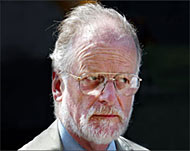Union vows to support ‘leak’ journalist
Any attempt by the BBC to sack or discipline the reporter at the centre of the Hutton report will trigger an industrial dispute, a union leader has warned.

The president of the National Union of Journalists, Jeremy Dear, told Aljazeera.net that the union would take action against the BBC if Andrew Gilligan was victimised.
“Our reaction would be to immediately back him, to represent him at any subsequent hearings, and to argue with our members that they should take whatever action is necessary to protect his position,” he said.
“Any investigative journalist performing a public service has to feel that they are being supported. The worst thing that could come out of the Hutton report would be for journalists to become timid in the face of government attempts to manipulate the news agenda.”
Gilligan, a defence correspondent for the BBC’s Today radio programme, set off a train of events that led to the death of the government scientist Dr David Kelly.
‘Sexed-up’ intelligence
|
“The worst thing that could come out of the Hutton report would be for journalists to become timid in the face of government attempts to manipulate the news agenda” Jeremy Dear, |
The controversy first broke when he broadcast a report last May claiming the government had “sexed-up” an intelligence dossier the previous September to sell the case for war.
The BBC defended Gilligan’s refusal to name Kelly as his source for the story, but Kelly’s name was leaked to the press by officials at the Ministry of Defence, for whom he worked.
A media frenzy ensued and on 18 July David Kelly’s body was found in woods near his Oxfordshire home, where he had apparently committed suicide.
The Hutton Inquiry was launched with a narrow remit to investigate the circumstances of Kelly’s death, and Gilligan was served on Tuesday with an advance copy of the findings.
“Both he and the BBC feel that they will come in for some criticism,” Dear said. “But they don’t necessarily accept that it will all be justified.”
Public interest
“Andrew’s story revealed how the reasons given by the government to justify the invasion of Iraq were dubious. It also reflected genuine concerns in the intelligence services that their work had been manipulated for political ends.
“He is very confident that his story was in the public interest and will be recognised as such. After all, it was the government who confirmed Kelly’s name to the media, not Andrew Gilligan.”
There was support for the NUJ’s stand from Dr Anas al-Tikriti, spokesman for the Muslim Association of Britain.
 |
|
Kelly apparently committed |
“Andrew Gilligan tried to bring something of the truth to the people and it seems that the system cannot accept that,” Dr al-Tikriti told Aljazeera.net.
“I think this episode shows quite clearly the levels that the establishment will stoop to in trying to quash the truth. It is extremely alarming.”
‘Dodgy dossier’
Gilligan’s sin, in government eyes, was to say that 10 Downing St included a claim in their “dodgy dossier” last September that Iraq could launch a chemical and biological attack in 45 minutes when they knew it to be wrong.
The Hutton report has criticised Gilligan for not checking Kelly’s claims with the Ministry of Defence and the BBC for not taking the government department’s post-broadcast denials seriously.
The debate over who was responsible for the naming of David Kelly as the source left many Britons cold.
“The issues our people want to hear about are why we went to war, and where the intelligence about weapons of mass destruction came from,” Dr al-Tikriti said.
“Tragic as the death of Dr David Kelly might be, it is baffling that we are spending so much time, effort and money on investigating it, while the deaths of tens of thousands in Iraq – including several dozen of our own troops – take place without so much as a whimper.”
Protests
|
“Tragic as the death of Dr David Kelly might be, it is baffling that we are spending so much time, effort and money on investigating it, while the deaths of tens of thousands in Iraq – including several dozen of our own troops – take place without so much as a whimper” Dr Anas al-Tikriti, |
Meanwhile, protests are planned to coincide with the release of the Hutton report to parliament.
A spokesman for the Stop the War Coalition told Aljazeera.net there would be a demonstration of around 200 people outside Parliament on Wednesday, and a picket of up to a thousand people outside 10 Downing St on Saturday.
Both actions would be “photo opportunities”, he said.
A national day of action is planned for the war’s anniversary on 20 March, where 16,000 black balloons will be released into the London sky, one for every victim of the Iraqi conflict.
Muslim apathy
For now though, the mood amongst the country’s Muslim community is a long way from the heady days of last February, when two million marched against the war.
“The apathy going around is substantial and quite terrifying,” Dr al-Tikriti said. “Trust has been eroded and the people I have spoken to in recent weeks all expect a whitewash to come out of Hutton. The effect will be further disaffection.”